上海牛津英语七年级上册
- 格式:docx
- 大小:22.26 KB
- 文档页数:17
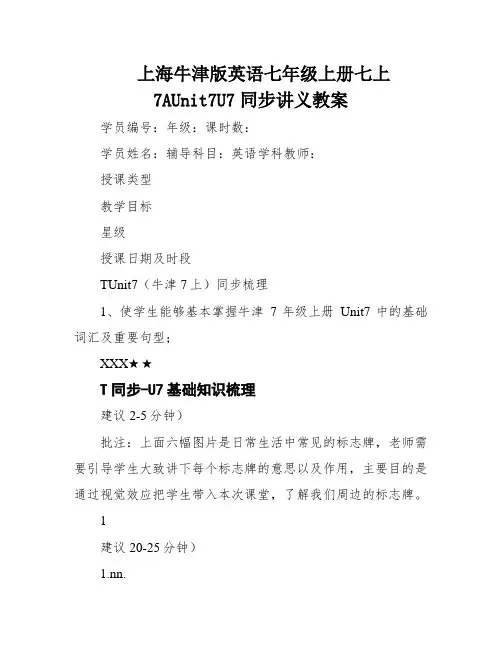
上海牛津版英语七年级上册七上7AUnit7U7同步讲义教案学员编号:年级:课时数:学员姓名:辅导科目:英语学科教师:授课类型教学目标星级授课日期及时段TUnit7(牛津7上)同步梳理1、使学生能够基本掌握牛津7年级上册Unit7中的基础词汇及重要句型;XXX★★T同步-U7基础知识梳理建议2-5分钟)批注:上面六幅图片是日常生活中常见的标志牌,老师需要引导学生大致讲下每个标志牌的意思以及作用,主要目的是通过视觉效应把学生带入本次课堂,了解我们周边的标志牌。
1建议20-25分钟)1.nn.词性转换】directorn.导演directv.指导影象】in all ns四周八方;各方面;in the n of朝……偏向例句:In which n are you going。
XXX?你筹办往哪一个偏向走,向北照旧向南?讲明:让学生追念看片子的时分,在片子开头会播放职员表,导演的英语是甚么呀?下主要记得在生中累计英语单词哦~2.Warningadj.警告、警示;词性转换】warn[wɔ:n]v.告诫、警示例句:Because of her warning。
I was careful.由于她的提示,我很谨慎。
Let it be a warning to you.以它为鉴吧。
常识拓展】warn sb not to do sth批注:比较warn sb。
not to do / decide sb。
not to do.nadj.申明用法的、操纵指南的;记忆】ask for n请示,give ns to do something指挥∕命令(做某事)例句:Read the XXX看一下袋子上的申明。
4.silencen.悄然、无声;词性转换】silent['sailənt]adj.寂静的、沉默的;silently['sailəntli]adv.寂静地;无声地例句:Jane first XXX silence.XXX首先打破沉默。
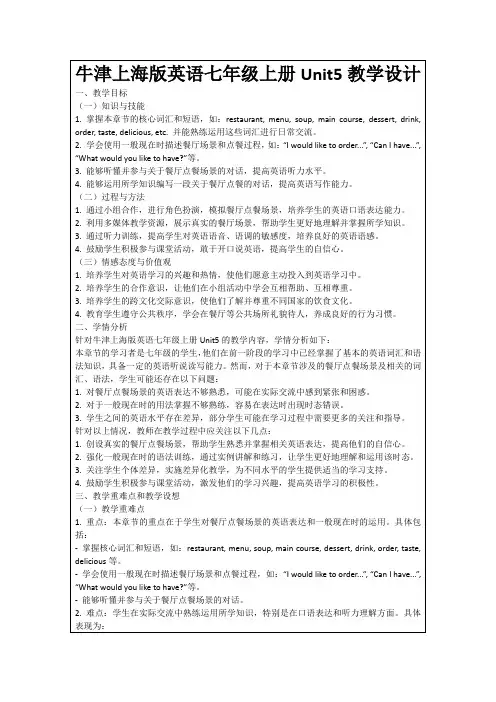
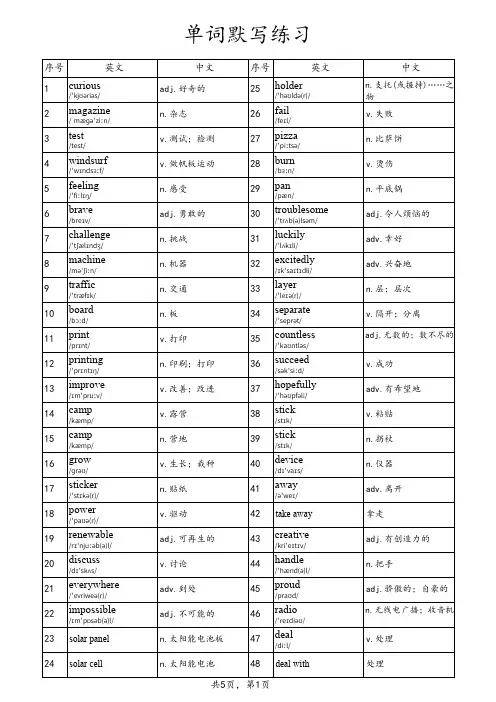
单词默写练习序号 英文 中文序号 英文 中文1curious/ˈkjʊəriəs/adj.好奇的25holder/ˈhəʊldə(r)/n.支托(或握持)……之物2magazine/ˌmæɡəˈziːn/n.杂志26fail/feɪl/v.失败3test/test/v.测试;检测27pizza/ˈpiːtsə/n.比萨饼4windsurf/ˈwɪndsɜːf/v.做帆板运动28burn/bɜːn/v.烫伤5feeling/ˈfiːlɪŋ/n.感受29pan/pæn/n.平底锅6brave/breɪv/adj.勇敢的30troublesome/ˈtrʌb(ə)lsəm/adj.令人烦恼的7challenge/ˈtʃælɪndʒ/n.挑战31luckily/ˈlʌkɪli/adv.幸好8machine/məˈʃiːn/n.机器32excitedly/ɪkˈsaɪtɪdli/adv.兴奋地9traffic/ˈtræfɪk/n.交通33layer/ˈleɪə(r)/n.层;层次10board/bɔːd/n.板34separate/ˈseprət/v.隔开;分离11print/prɪnt/v.打印35countless/ˈkaʊntləs/adj.无数的;数不尽的12printing/ˈprɪntɪŋ/n.印刷;打印36succeed/səkˈsiːd/v.成功13improve/ɪmˈpruːv/v.改善;改进37hopefully/ˈhəʊpfəli/adv.有希望地14camp/kæmp/v.露营38stick/stɪk/v.粘贴15camp/kæmp/n.营地39stick/stɪk/n.拐杖16grow/ɡrəʊ/v.生长;栽种40device/dɪˈvaɪs/n.仪器17sticker/ˈstɪkə(r)/n.贴纸41away/əˈweɪ/adv.离开18power/ˈpaʊə(r)/v.驱动42take away拿走19renewable/rɪˈnjuːəb(ə)l/adj.可再生的43creative/kriˈeɪtɪv/adj.有创造力的20discuss/dɪˈskʌs/v.讨论44handle/ˈhænd(ə)l/n.把手21everywhere/ˈevriweə(r)/adv.到处45proud/praʊd/adj.骄傲的;自豪的22impossible/ɪmˈpɒsəb(ə)l/adj.不可能的46radio/ˈreɪdiəʊ/n.无线电广播;收音机23solar panel n.太阳能电池板47deal/diːl/v.处理24solar cell n.太阳能电池48deal with处理49fear/fɪə(r)/n.害怕;担忧74ring/rɪŋ/v.回响50deep/diːp/adj.低沉的;深的75after all毕竟51rough/rʌf/adj.令人不舒服的;粗糙的76decide/dɪˈsaɪd/v.决定52belief/bɪˈliːf/n.信念;相信77become/bɪˈkʌm/v.变成53ourselves/ɑːˈselvz/pron.(we的反身形式)我们自己78through/θruː/prep.凭借54weak/wiːk/adj.虚弱的;无力的79preparation/ˌprepəˈreɪʃ(ə)n/n.准备55heart/hɑːt/n.心脏;内心80breath/breθ/n.呼吸;呼气56paper cutting剪纸81crowd/kraʊd/n.观众;人群57difficulty/ˈdɪfɪkəlti/n.困难82chant/tʃɑːnt/v.反复呼喊;反复唱58teenager/ˈtiːneɪdʒə(r)/n.青少年83bright/braɪt/adj.快活而生气勃勃的;明亮的59honest/ˈɒnɪst/adj.坦率的;诚实的84coach/kəʊtʃ/n.教练60alive/əˈlaɪv/adj.继续存在的;活着的85enter/ˈentə(r)/v.进来61mascot/ˈmæskət/n.吉祥物86enter for报名参加62dream/driːm/v.梦想;做梦87design/dɪˈzaɪn/n.设计63final/ˈfaɪn(ə)l/adj.最终的88competition/ˌkɒmpəˈtɪʃ(ə)n/n.竞争;比赛64sink/sɪŋk/v.下沉;沉没89chance/tʃɑːns/n.机会65later/ˈleɪtə(r)/adv.随后;后来90past/pɑːst/adj.过去的;以往的66news/njuːz/n.消息91past/pɑːst/prep.经过67funny/ˈfʌni/adj.滑稽的;好笑的92deskmate/ˈdeskmeɪt/n.同桌68costume/ˈkɒstjuːm/n.服装;演出服93while/waɪl/n.一会儿;一受时间69instead/ɪnˈsted/adv.代替94while/waɪl/conj.(对比两件事物)然而70instead of代替95firmly/ˈfɜːmli/adv.坚定地;坚固地71had better最好96career/kə'rɪə(r)/n.职业;事业72disappointment/ˌdɪsəˈpɔɪntmənt/n.失望97guidance/ˈɡaɪd(ə)ns/n.指导;引导73respond/rɪˈspɒnd/v.作出反应;回应98practical/ˈpræktɪkl/adj.实际的99hairdresser/ˈheədresə(r)/n.理发师124communication/kəˌmjuːnɪˈkeɪʃ(ə)n/n.交流;交际100tailor/ˈteɪlə(r)/n.裁缝125training/ˈtreɪnɪŋ/n.训练;培训101service/ˈsɜːvɪs/n.服务126taste/teɪst/v.品尝102officer/ˈɒfɪsə(r)/n.长官127maybe/ˈmeɪbi/adv.有可能103fireman/ˈfaɪəmən/n.消防员128yours/jɔːz/pron.您的;你的;你们的104artistic/ɑːˈtɪstɪk/adj.艺术的129customer/ˈkʌstəmə(r)/n.顾客;客户105photographer/fəˈtɒɡrəfə(r)/n.摄影师130market/ˈmɑːkɪt/n.市场;集市106artist/ˈɑːtɪst/n.艺术家131everything/ˈevriθɪŋ/pron.每样事物107actor/actress n.(男/女)演员132fresh/ˈevriθɪŋ/adj.新鲜的108engineer/ˌendʒɪˈnɪə(r)/n.工程师133restaurant/ˈrestrɒnt/n.餐厅109architect/ˈɑːkɪtekt/n.建筑师134pride/praɪd/n.骄傲;自豪110designer/dɪˈzaɪnə(r)/n.设计师135dabbawala n.(印度)送饭盒人111entertain/ˌentəˈteɪn/v.使快乐;娱乐136kilometre(kilometer)n.公里;千米112audience/ˈɔːdiəns/n.观众137exactly/ɪɡˈzæktli/adv.确切地113set/set/n.摄影场138ever/ˈevə(r)/adj在任何时候;从来114set/set/adj.指定的139centre(center)n.中心;中央115role/rəʊl/n.角色140greet/ɡriːt/v.打招呼;欢迎116scene/siːn/n.现场;场景141distance/ˈdɪstəns/n.距离117arrive/əˈraɪv/v.到达142method/ˈmeθəd/n.方法;措施118page/peɪdʒ/n.(书刊或纸张的)页143simple/ˈsɪmp(ə)l/adj.简单的119knowledge/ˈnɒlɪdʒ/n.知识;学问144railway/ˈreɪlweɪ/n.铁路;铁道120biology/baɪˈɒlədʒi/n.生物学145each other相互;彼此121education/ˌedʒuˈkeɪʃ(ə)n/n.教育146address/əˈdres/n.地址122above/əˈbʌv/adv.(水平)超过,更多,更大147deliver/dɪˈlɪvə(r)/v.递送123readiness/ˈredinəs/n.乐意148serve/sɜːv/v.服务149trust/trʌst/n.信任174personal/ˈpɜːsən(ə)l/adj.个人的;私人的150respect/rɪˈspekt/n.尊重;尊敬175owner/ˈəʊnə(r)/n.物主;主人151respect/rɪˈspekt/v.尊重;尊敬176alarm clock闹钟152lively/ˈlaɪvli/adj.有活力的;活泼的177keep track of追踪153dictionary/ˈdɪkʃən(ə)ri/n.词典;字典178schedule/ˈʃedjuːl/n.日程安排154Camera/ˈkæm(ə)rə/n.照相机;摄影机179health care医疗(服务)155speaker/ˈspiːkə(r)/n.扬声器;喇叭180order/ˈɔːdə(r)/v.订购156thermostat/ˈθɜːməstæt/n.温控器181signal/ˈsɪɡnəl/v.发信号;示意157itself/ɪtˈself/pron.它自己(it的反身形式)182sense/sens/v.感觉到;意识到158alarm/əˈlɑːm/n.警报器183manage/ˈmænɪdʒ/v.明智地使用;管理;完成(困难的事)159stranger/ˈstreɪndʒə(r)/n.陌生人184remind/rɪˈmaɪnd/v.提醒;使……想起160lock/lɒk/n.锁185produce/prəˈdjuːs/v.生产161explore/ɪkˈsplɔː(r)/v.探索; 探究186store/stɔː(r)/v.保存162rock/rɒk/v.(使)轻轻播晃187sore/sɔː(r)/adj.疼痛的;酸痛的163shower/ˈʃaʊə(r)/n.淋浴188throat/θrəʊt/n.嗓子164mode/məʊd/n.模式;方式189understand/ˌʌndəˈstænd/v.懂;理解165text message(手机)短信息190already/ɔːlˈredi/adv.已经166bedroom/ˈbedruːm/n.卧室191depend/dɪˈpend/v.根据……而定;依靠167bathroom/ˈbɑːθruːm;ˈbɑːθrʊm/n.浴室;盥洗室192depend on依赖168suggest/səˈdʒest/v.建议193oven/ˈʌv(ə)n/n.烤箱;烤炉169protect/prəˈtekt/v.保护194truly/ˈtruːli/adv.确实地;真诚地170review/rɪˈvjuː/n.评论195expect/ɪkˈspekt/v.期望;期待171review/rɪˈvjuː/v.复习196pleasant/ˈplez(ə)nt/adj.令人愉快的172heating/ˈhiːtɪŋ/n.供暖;暖气设备197element/ˈelɪmənt/n.要素173guide/ɡaɪd/v.指导;指引198plot/plɒt/n.故事情节199main/meɪn/adj.主要的224fox/fɒks/n.狐狸200director/dəˈrektə(r);daɪˈrektə(r)/n.导演;(某一活动的)负责人225imagination/ɪˌmædʒɪˈneɪʃ(ə)n/n.想象;想象力201polite/pəˈlaɪt/adj.有礼貌的226meaningful/ˈmiːnɪŋf(ə)l/adj.有意义的202impolite/ˌɪmpəˈlaɪt/adj.不礼貌的227form/fɔːm/n.形式;类型203correct/kəˈrekt/adj.准确无误的228ink/ɪŋk/n.墨水204incorrect/ˌɪnkəˈrekt/adj.不准确的229painting/ˈpeɪntɪŋ/n.绘画205screen/skriːn/n.银幕;屏幕230make-up n.化妆品206web/web/n.网231pretty/ˈprɪti/adj.漂亮的207spider/ˈspaɪdə(r)/n.蜘蛛232custom/ˈkʌstəm/n.习俗208friendship/ˈfrendʃɪp/n.友谊;朋友关系233rich/rɪtʃ/adj.丰富的209animation/ˌænɪˈmeɪʃ(ə)n/n.动画片(制作)234whole/həʊl/adj.完全的210subtitle/ˈsʌbtaɪtl/n.字幕235magic/ˈmædʒɪk/n.魔法211true/truː/adj.真实的236special effects(电影或电视节日的)特技效果212wrestle/ˈres(ə)l/v.摔跤237recommend/ˌrekəˈmend/v.推荐;建议213weekday/ˈwiːkdeɪ/n.周工作日(星期一到星期五的任何一天)238metre (meter)n.米214ocean/ˈəʊʃ(ə)n/n.海洋239locate/ləʊˈkeɪt/v.确定……的准确地点215classic/ˈklæsɪk/n.(书、电影或歌曲的)经典作品240total/ˈtəʊt(ə)l/adj.总的216classic/ˈklæsɪk/adj.经典的241length/leŋkθ;leŋθ/n.长度217return/rɪˈtɜːn/v.回来242height/haɪt/n.高度218common/ˈkɒmən/adj.共同的;常见的243influence/ˈɪnfluəns/n.影响219generation/ˌdʒenəˈreɪʃ(ə)n/n.代;一代人244poster/ˈpəʊstə(r)/n.海报220animated/ˈænɪmeɪtɪd/adj.动画的;有生气的245breathe/briːð/v.呼吸221hero/ˈhɪərəʊ/n.男主人公;英雄246frozen/ˈfrəʊz(ə)n/adj.冰冻的222fight/faɪt/v.打斗247trainer/ˈtreɪnə(r)/n.教练223silly/ˈsɪli/adj.愚蠢的;不明事理的248adventure/ədˈventʃə(r)/n.冒险。
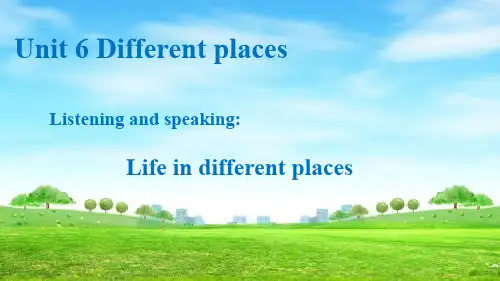
Unit 6 Different placesListening and speaking:Life in different placesLook, listen and learn!p_ _ceful ea qui_t e pl_ _s_nt ea ar_ l _xing ae /❒✋●✌♦✋☠// ☐●♏⏹♦/令人愉快的/ ☐♓♦♐●/平静的Look, listen and learn!n_ _syoi/✋♦♋✋♦✋☠/exciting c_ _v_n_ _nt / ☜⏹♓⏹✋☜⏹♦/方便的o n e ie/ ⏹✋✋/吵闹的excitingbusyinterestingconvenientnoisyquietrelaxingpleasantpeacefulTown center VS suburbsIn the city centerIn the suburbsS1:Do you like living in the city centre or the suburbs?S2:I like living in ….It’s ….S2:Do you like …or …?S1:I like ….It’s….noisypleasantquietpeacefulinterestingexcitingbusyrelaxingconvenient…Work in pairs!What can you see around your neighbourhood?Look at my neighbourhood!/ ♐♋☺⏹♦☜⏹/ 喷泉f_ _ntain ouThere is a fountain in my neighbourhood.在小区内有一个喷泉。
/ ✋⏹♎☜♈♦⏹/k_ nd_ _g_ _ t_n i er ar eThere isn’t a kindergarten in my neighbourhood.在我小区没有幼儿园。
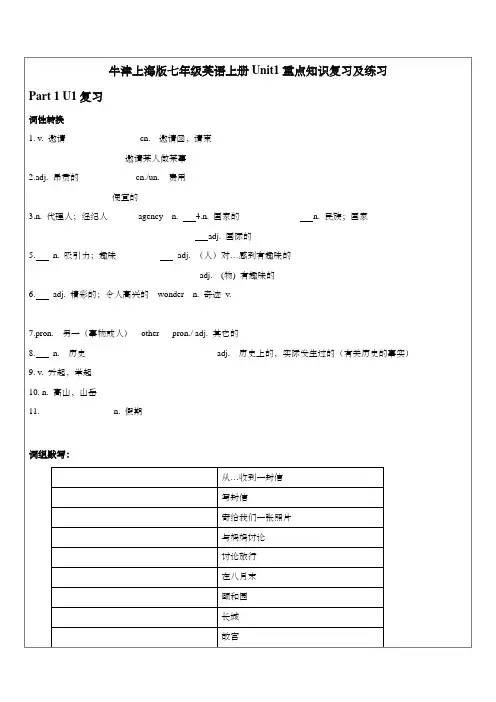
2) 形容词比较级+than the other+复数名词。
例如:Asia is bigger than the other continents on the earth.亚洲是地球上最大的洲◆形容词的常用结构:◇a + adj + n a tall boy ◇be + adj. He is tall.◇keep/find/make/think… it adj. to / that …… ◇be + as + adj. + as do + as + adv. + as1)形容词在句子中的句法作用及位置:⑴ 作定语,放在名......词的前面....,.修饰名词。
结构:a/an/ …_______ 名词 ★ 后置的情况:修饰复合不定代词时放在代词之后。
如:Something serious has happened to him .(他发生了严重的事故) 1. Every minute there is _____going on here.A. exciting somethingB. something excitingC. exciting anythingD. anything exciting 2. This river is about 5 feet ________. A. deep B. widely C. depth D. Length★ 少数形容词只能作定语这些形容词包括 little, live , elder, eldest 等,只能作定语,不能作表语。
例如:(正)My elder brother is a doctor. (误)My brother is elder than I. (正)This is a little house.(误)The house is little. (正)Do you want live fish or dead one?(误)The old monkey is still live.⑵作表语时放在连系动词之后,构成系表结构。
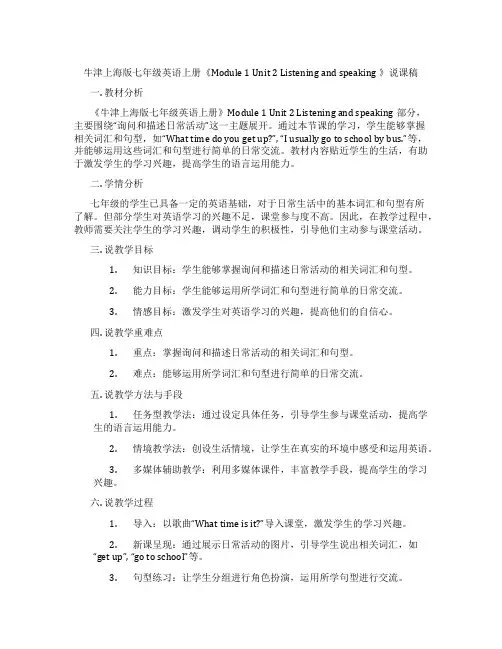
牛津上海版七年级英语上册《Module 1 Unit 2 Listening and speaking 》说课稿一. 教材分析《牛津上海版七年级英语上册》Module 1 Unit 2 Listening and speaking部分,主要围绕“询问和描述日常活动”这一主题展开。
通过本节课的学习,学生能够掌握相关词汇和句型,如“What time do you get up?”, “I usually go to school by bus.”等,并能够运用这些词汇和句型进行简单的日常交流。
教材内容贴近学生的生活,有助于激发学生的学习兴趣,提高学生的语言运用能力。
二. 学情分析七年级的学生已具备一定的英语基础,对于日常生活中的基本词汇和句型有所了解。
但部分学生对英语学习的兴趣不足,课堂参与度不高。
因此,在教学过程中,教师需要关注学生的学习兴趣,调动学生的积极性,引导他们主动参与课堂活动。
三. 说教学目标1.知识目标:学生能够掌握询问和描述日常活动的相关词汇和句型。
2.能力目标:学生能够运用所学词汇和句型进行简单的日常交流。
3.情感目标:激发学生对英语学习的兴趣,提高他们的自信心。
四. 说教学重难点1.重点:掌握询问和描述日常活动的相关词汇和句型。
2.难点:能够运用所学词汇和句型进行简单的日常交流。
五. 说教学方法与手段1.任务型教学法:通过设定具体任务,引导学生参与课堂活动,提高学生的语言运用能力。
2.情境教学法:创设生活情境,让学生在真实的环境中感受和运用英语。
3.多媒体辅助教学:利用多媒体课件,丰富教学手段,提高学生的学习兴趣。
六. 说教学过程1.导入:以歌曲“What time is it?”导入课堂,激发学生的学习兴趣。
2.新课呈现:通过展示日常活动的图片,引导学生说出相关词汇,如“get up”, “go to school”等。
3.句型练习:让学生分组进行角色扮演,运用所学句型进行交流。
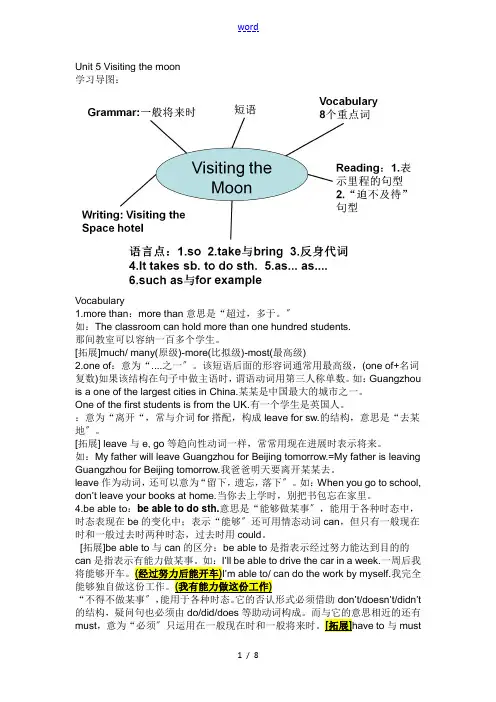
Unit 5 Visiting the moon学习导图:Vocabulary1.more than:more than意思是“超过,多于。
〞如:The classroom can hold more than one hundred students.那间教室可以容纳一百多个学生。
[拓展]much/ many(原级)-more(比拟级)-most(最高级)2.one of:意为“....之一〞。
该短语后面的形容词通常用最高级,(one of+名词复数)如果该结构在句子中做主语时,谓语动词用第三人称单数。
如:Guangzhou is a one of the largest cities in China.某某是中国最大的城市之一。
One of the first students is from the UK.有一个学生是英国人。
:意为“离开“,常与介词for搭配,构成leave for sw.的结构,意思是“去某地〞。
[拓展] leave与e, go等趋向性动词一样,常常用现在进展时表示将来。
如:My father will leave Guangzhou for Beijing tomorrow.=My father is leaving Guangzhou for Beijing tomorrow.我爸爸明天要离开某某去。
leave作为动词,还可以意为“留下,遗忘,落下〞。
如:When you go to school, don’t leave your books at home.当你去上学时,别把书包忘在家里。
4.be able to:be able to do sth.意思是“能够做某事〞,能用于各种时态中,时态表现在be的变化中;表示“能够〞还可用情态动词can,但只有一般现在时和一般过去时两种时态,过去时用could。
[拓展]be able to与can的区分:be able to是指表示经过努力能达到目的的can是指表示有能力做某事。
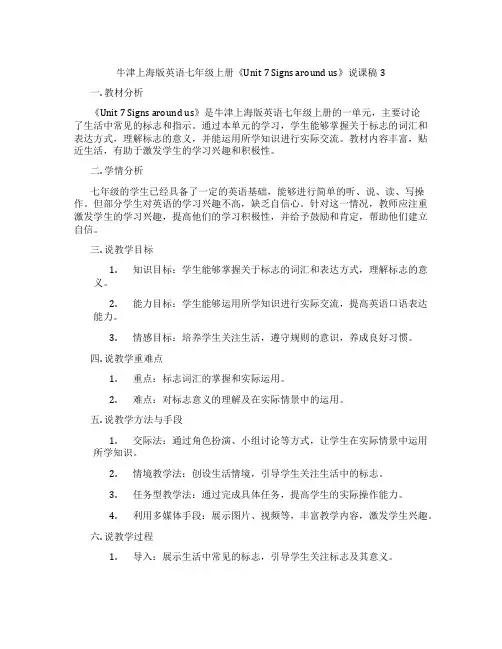
牛津上海版英语七年级上册《Unit 7 Signs around us》说课稿3一. 教材分析《Unit 7 Signs around us》是牛津上海版英语七年级上册的一单元,主要讨论了生活中常见的标志和指示。
通过本单元的学习,学生能够掌握关于标志的词汇和表达方式,理解标志的意义,并能运用所学知识进行实际交流。
教材内容丰富,贴近生活,有助于激发学生的学习兴趣和积极性。
二. 学情分析七年级的学生已经具备了一定的英语基础,能够进行简单的听、说、读、写操作。
但部分学生对英语的学习兴趣不高,缺乏自信心。
针对这一情况,教师应注重激发学生的学习兴趣,提高他们的学习积极性,并给予鼓励和肯定,帮助他们建立自信。
三. 说教学目标1.知识目标:学生能够掌握关于标志的词汇和表达方式,理解标志的意义。
2.能力目标:学生能够运用所学知识进行实际交流,提高英语口语表达能力。
3.情感目标:培养学生关注生活,遵守规则的意识,养成良好习惯。
四. 说教学重难点1.重点:标志词汇的掌握和实际运用。
2.难点:对标志意义的理解及在实际情景中的运用。
五. 说教学方法与手段1.交际法:通过角色扮演、小组讨论等方式,让学生在实际情景中运用所学知识。
2.情境教学法:创设生活情境,引导学生关注生活中的标志。
3.任务型教学法:通过完成具体任务,提高学生的实际操作能力。
4.利用多媒体手段:展示图片、视频等,丰富教学内容,激发学生兴趣。
六. 说教学过程1.导入:展示生活中常见的标志,引导学生关注标志及其意义。
2.新课呈现:通过图片、视频等手段,展示本节课的主要内容,引导学生学习标志词汇和表达方式。
3.课堂活动:采用角色扮演、小组讨论等形式,让学生在实际情景中运用所学知识。
4.任务型活动:设计具体任务,如制作标志、模拟情景等,提高学生的实际操作能力。
5.巩固环节:通过游戏、练习等手段,巩固所学知识。
6.课堂小结:对本节课的内容进行总结,强调重点知识。
7.作业布置:布置相关任务,让学生课后巩固所学知识。
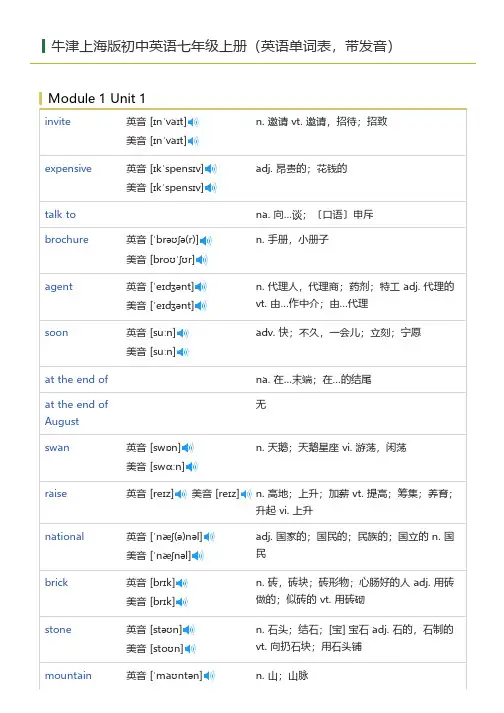
牛津上海版初中英语七年级上册(英语单词表,带发音)Module 1 Unit 1invite英音 [ɪnˈvaɪt]美音 [ɪnˈvaɪt]n. 邀请 vt. 邀请,招待;招致expensive英音 [ɪkˈspensɪv]美音 [ɪkˈspensɪv]adj. 昂贵的;花钱的talk to na. 向…谈;〔口语〕申斥brochure英音 [ˈbrəʊʃə(r)]美音 [broʊˈʃʊr]n. 手册,小册子agent英音 [ˈeɪdʒənt]美音 [ˈeɪdʒənt]n. 代理人,代理商;药剂;特工 adj. 代理的vt. 由…作中介;由…代理soon英音 [suːn]美音 [suːn]adv. 快;不久,一会儿;立刻;宁愿at the end of na. 在…末端;在…的结尾at the end ofAugust无swan英音 [swɒn]美音 [swɑːn]n. 天鹅;天鹅星座 vi. 游荡,闲荡raise英音 [reɪz]美音 [reɪz]n. 高地;上升;加薪 vt. 提高;筹集;养育;升起 vi. 上升national英音 [ˈnæʃ(ə)nəl]美音 [ˈnæʃnəl]adj. 国家的;国民的;民族的;国立的 n. 国民brick英音 [brɪk]美音 [brɪk]n. 砖,砖块;砖形物;心肠好的人 adj. 用砖做的;似砖的 vt. 用砖砌stone英音 [stəʊn]美音 [stoʊn]n. 石头;结石;[宝] 宝石 adj. 石的,石制的vt. 向扔石块;用石头铺mountain英音 [ˈmaʊntən]n. 山;山脉Module 1 Unit 2美音 [ˈma ʊntn]ancient英音 [ˈe ɪn ʃənt]美音 [ˈe ɪn ʃənt]n. 古代人;老人 adj. 古代的;古老的,过时的;年老的history英音 [ˈh ɪst(ə)ri]美音 [ˈh ɪstri]n. 历史,历史学;历史记录;来历interest英音 [ˈɪntr əst]美音 [ˈɪntr əst; ˈɪntrest]n. 兴趣,爱好;利息;趣味;同行 vt. 使……感兴趣;引起……的关心;使……参与holiday英音 [ˈh ɒl əde ɪ]美音 [ˈhɑːl əde ɪ]n. 假日;节日;休息日 vi. 外出度假wonderful英音 [ˈw ʌnd əf(ə)l]美音 [ˈw ʌnd ərf(ə)l]adj. 极好的,精彩的,绝妙的;奇妙的;美妙;胜;神妙another英音 [əˈn ʌðə(r)]美音 [əˈn ʌðər]prep. 另一个;另一个人 adj. 又一,另一;另外的;不同的 pron. 另一个;又一个officer英音 [ˈɒf ɪs ə(r)]美音 [ˈɑːf ɪs ər]n. 军官,警官;公务员,政府官员;船长 vt.指挥society英音 [s əˈsa ɪəti]美音 [s əˈsa ɪəti]n. 社会;交往;社团;社交界prevention英音 [pr ɪˈven ʃn]美音 [pr ɪˈven ʃn]n. 预防;阻止;妨碍cruelty英音 [ˈkru ːəlti]美音 [ˈkru ːəlti]n. 残酷;残忍;残酷的行为someone英音 [ˈs ʌmw ʌn]美音 [ˈs ʌmw ʌn]pron. 有人,某人puppy英音 [ˈp ʌpi]美音 [ˈp ʌpi]n. 小狗,幼犬thirsty英音 [ˈθɜːsti]美音 [ˈθɜːrsti]adj. 口渴的,口干的;渴望的,热望的lovely英音 [ˈlʌvli]美音 [ˈlʌvli]adj. 可爱的;令人愉快的;爱恋的;秀丽的,优美的 n. 美女;可爱的东西as英音 [əz]美音 [əz; æz]conj. 因为;随着;虽然;依照;当…时 prep.如同;当作;以…的身份 adv. 同样地;和……prefer英音 [prɪˈfɜː(r)]美音 [prɪˈfɜːr]vt. 更喜欢;宁愿;提出;提升 vi. 喜欢;愿意care英音 [keə(r)]美音 [ker]n. 关怀;照料;谨慎;忧虑 vt. 在意;希望或喜欢 vi. 照顾;关心;喜爱;顾虑take care of na. 照看;处理;清除booklet英音 [ˈbʊklət]美音 [ˈbʊklət]n. 小册子special英音 [ˈspeʃ(ə)l]美音 [ˈspeʃl]n. 特使,特派人员;特刊;特色菜;专车;特价商品 adj. 特别的;专门的,专用的chew英音 [tʃuː]美音 [tʃuː]n. 咀嚼;咀嚼物 vi. 细想,深思 vt. 嚼碎,咀嚼basket英音 [ˈbɑːskɪt]美音 [ˈbæskɪt]n. 篮子;(篮球比赛的)得分;一篮之量;篮筐 vt. 装入篮blanket英音 [ˈblæŋkɪt]美音 [ˈblæŋkɪt]n. 毛毯,毯子;毯状物,覆盖层 adj. 总括的,全体的;没有限制的 vt. 覆盖,掩盖;…unkind英音 [ˌʌnˈkaɪnd]美音 [ˌʌnˈkaɪnd]adj. 无情的;不仁慈的,不厚道的clinic英音 [ˈklɪnɪk]美音 [ˈklɪnɪk]n. 临床;诊所vet 英音 [vet]美音 [vet]n. 兽医 vt. 审查;诊疗 vi. 作兽医;诊疗cave英音 [keɪv]美音 [keɪv]n. 洞穴,窑洞 vi. 凹陷,塌落;投降 vt. 使凹陷,使塌落;在…挖洞穴guard英音 [ɡɑːd]美音 [ɡɑːrd]n. 守卫;警戒;护卫队;防护装置 vi. 警惕 vt.保卫;监视Module 1 Unit 3blind 英音 [bla ɪnd]美音 [bla ɪnd]n. 掩饰,借口;百叶窗 adj. 盲目的;瞎的 vt.使失明;使失去理智adv 盲目地;看不见地safely 英音 [ˈse ɪfli]美音 [ˈse ɪfli]adv. 安全地 稳定地police 英音 [p əˈli ːs]美音 [p əˈli ːs]n. 警察,警方;治安 adj. 警察的;有关警察的 vt. 监督;管辖;维持治安;为…配备警察thief 英音 [θi ːf]美音 [θi ːf]n. 小偷,贼missing英音 [ˈm ɪs ɪŋ]美音 [ˈm ɪs ɪŋ]adj. 失踪的;缺少的 v. 错过(miss的ing形式);想念;漏掉hunt 英音 [h ʌnt]美音 [h ʌnt]n. 狩猎;搜寻 vt. 打猎;搜索 vi. 打猎;搜寻foreigner英音 [ˈf ɒr ən ə(r)]美音 [ˈf ɔːr ən ər]n. 外地人,外国人crowded英音 [ˈkra ʊd ɪd]美音 [ˈkra ʊd ɪd]adj. 拥挤的;塞满的 v. 拥挤(crowd的过去分词)example英音 [ɪɡˈzɑːmp(ə)l]美音 [ɪɡˈzæmpl]n. 例子;榜样 vt. 作为…的例子;为…做出榜样 vi. 举例for example英音 [f ɔ: iɡˈzɑ:mpl]美音 [f ɔr ɪɡˈzæmp əl]na. 例如Canada英音 [ˈkæn əd ə]美音 [ˈkæn əd ə]n. 加拿大(北美洲国家)Canadian英音 [k əˈne ɪdi ən]美音 [k əˈne ɪdi ən]n. 加拿大人 adj. 加拿大(人)的Australia英音 [ɒˈstre ɪli ə]美音 [ɔːˈstre ɪli ə]n. 澳大利亚,澳洲Australian英音 [ɒˈstre ɪli ən]美音 [ɔːˈstre ɪli ən]adj. 澳大利亚的,澳大利亚人的 n. 澳大利亚人India英音 [ˈɪndiə]美音 [ˈɪndiə]n. 印度(南亚国家)Indian英音 [ˈɪndiən]美音 [ˈɪndiən]n. 印度人;印第安人;印第安语 adj. 印度的;印第安人的;印第安语的Britain英音 [ˈbrɪt(ə)n]美音 [ˈbrɪt(ə)n]n. 英国;不列颠Briton英音 [ˈbrɪtn]美音 [ˈbrɪtn]n. 英国人;大不列颠人Japanese英音 [ˌdʒæpəˈniːz]美音 [ˌdʒæpəˈniːz]n. 日本人;日语 adj. 日本(人)的;日语的penfriend英音 [ˈpenfrend]美音 [ˈpenfrend]n. <英>笔友magazine英音 [ˌmæɡəˈziːn]美音 [ˈmæɡəziːn]n. 杂志;弹药库;胶卷盒sex 英音 [seks]美音 [seks]n. 性;性别;性行为;色情 vt. 引起…的性欲;区别…的性别nationality英音 [ˌnæʃəˈnæləti]美音 [ˌnæʃəˈnæləti]n. 国籍,国家;民族;部落international英音 [ˌɪntəˈnæʃ(ə)nəl]美音 [ˌɪntərˈnæʃnəl]n. 国际组织;国际体育比赛;外国居留者;国际股票 adj. 国际的;两国(或以上)国家的…British英音 [ˈbrɪtɪʃ]美音 [ˈbrɪtɪʃ]n. 英国人 adj. 英国的;英国人的;大不列颠的yourself英音 [jɔːˈself]美音 [jɔːrˈself; jʊrˈself; jərˈself]pron. 你自己male英音 [meɪl]美音 [meɪl]adj. 男性的;雄性的;有力的 n. 男人;雄性动物Toronto英音 [təˈrɒntəʊ]美音 [təˈrɑːntoʊ]n. 多伦多(加拿大城市)Module 2 Unit 4junior 英音 [ˈd ʒu ːni ə(r)]美音 [ˈd ʒu ːni ər]adj. 年少的;后进的;下级的 n. 年少者,晚辈;地位较低者;大学三年级学生block英音 [bl ɒk]美音 [blɑːk]n. 块;街区;大厦;障碍物 adj. 成批的,大块的;交通堵塞的 vt. 阻止;阻塞;限制;…architect英音 [ˈɑːk ɪtekt]美音 [ˈɑːrk ɪtekt]n. 建筑师 缔造者construction英音 [k ən ˈstr ʌk ʃn]美音 [k ən ˈstr ʌk ʃn]n. 建设;建筑物;解释;造句company英音 [ˈk ʌmp əni]美音 [ˈk ʌmp əni]n. 公司;陪伴,同伴;连队 vt. 陪伴 vi. 交往type英音 [ta ɪp]美音 [ta ɪp]n. 类型,品种;模范;样式 vt. 打字;测定(血等)类型 vi. 打字removal英音 [r ɪˈmu ːv(ə)l]美音 [r ɪˈmu ːvl]n. 免职;移动;排除;搬迁ambulance英音 [ˈæmbj əl əns]美音 [ˈæmbj əl əns]n. [车辆][医] 救护车;战时流动医院rescue英音 [ˈreskju ː]美音 [ˈreskju ː]n. 营救;援救;解救 vt. 营救;援救deliver英音 [d ɪˈl ɪv ə(r)]美音 [d ɪˈl ɪv ər]n. 投球 vt. 交付;发表;递送;释放;给予(打击);给…接生 vi. 实现;传送;履行;…parcel英音 [ˈpɑːs(ə)l]美音 [ˈpɑːrsl]n. 包裹,小包 vt. 打包;捆扎neighbour英音 [ˈne ɪb ə(r)]美音 [ˈne ɪb ər]n. n. 邻居;同胞;仁慈的人 vt. 邻接 vi. 住在邻近;毗邻;友善,和睦 adj. 邻居的;邻近的meeting英音 [ˈmi ːt ɪŋ]美音 [ˈmi ːt ɪŋ]n. 会议;会见;集会;汇合点 v. 会面;会合(meet的ing形式)manager英音 [ˈmæn ɪd ʒə(r)]n. 经理;管理人员Module 2 Unit 5美音 [ˈmæn ɪd ʒər]take notes na. 做记录accident英音 [ˈæks ɪd ənt]美音 [ˈæks ɪd ənt]n. 事故;意外;[法] 意外事件;机遇towards英音 [t əˈw ɔːdz]美音 [t ɔːrdz]prep. 朝,向;对于;有助于knock down na. 打倒;拆除;拆卸;(拍卖时)敲槌卖出catch fire na. 着火both ... and ...既...又...motorcyclist英音 [ˈm əʊt əsa ɪkl ɪst]美音 [ˈmo ʊt ərsa ɪkl ɪst]n. 骑摩托车的人;乘机车者hurt英音 [h ɜːt]美音 [h ɜːrt]n. 痛苦;危害;痛苦的原因 vt. 使受伤;损害;使疼痛;使痛心 adj. 受伤的;痛苦的;…run away na. 私奔;逃;弄不好broken英音 [ˈbr əʊk ən]美音 [ˈbro ʊk ən]v. 折断;打碎;损坏(break的过去分词)adj. 破碎的;坏掉的arm英音 [ɑːm]美音 [ɑːrm]n. 手臂;武器;袖子;装备;部门 vt. 武装;备战 vi. 武装起来engine英音 [ˈend ʒɪn]美音 [ˈend ʒɪn]n. 引擎,发动机;机车,火车头;工具fire engine英音 ['fa ɪə 'end ʒɪn]美音 [ˈfa ɪər ˈend ʒɪn]n. 消防车;救火车scene 英音 [si ːn]美音 [si ːn]n. 场面;情景;景象;事件carry英音 [ˈkæri]美音 [ˈkæri]n. 运载;[计] 进位;射程 vi. 能达到;被携带;被搬运 vt. 拿,扛;携带;支持;搬运choose英音 [t ʃu ːz]vt. 选择,决定 vi. 选择,挑选美音 [tʃuːz]bedroom英音 [ˈbedruːm]美音 [ˈbedruːm; ˈbedrʊm]n. 卧室 adj. 两性关系的;城郊住宅区的untidy英音 [ʌnˈtaɪdi]美音 [ʌnˈtaɪdi]adj. 不整洁的,凌乱的;懒散的;不干净利落的,不简练的;不适宜的 v. 使不整洁;使杂…tidy英音 [ˈtaɪdi]美音 [ˈtaɪdi]n. 椅子的背罩 adj. 整齐的;相当大的 vi. 整理;收拾 vt. 整理;收拾;弄整齐tidy up v. 整理干净wardrobe英音 [ˈwɔːdrəʊb]美音 [ˈwɔːrdroʊb]n. 衣柜;行头;全部戏装living room英音 ['lɪvɪŋ ru:m]美音 [ˈlɪvɪŋ ruːm]n. 客厅;起居室bathroom英音 [ˈbɑːθruːm; ˈbɑːθrʊm]美音 [ˈbæθruːm]n. 浴室;厕所;盥洗室balcony英音 [ˈbælkəni]美音 [ˈbælkəni]n. 阳台;包厢;戏院楼厅estate英音 [ɪˈsteɪt]美音 [ɪˈsteɪt]n. 房地产;财产;身份agency英音 [ˈeɪdʒənsi]美音 [ˈeɪdʒənsi]n. 代理,中介;代理处,经销处matter英音 [ˈmætə(r)]美音 [ˈmætər]n. 物质;事件 vi. 有关系;要紧suburb英音 [ˈsʌbɜːb]美音 [ˈsʌbɜːrb]n. 郊区;边缘helper英音 [ˈhelpə(r)]美音 [ˈhelpər]n. 助手,帮手sofa英音 [ˈsəʊfə]美音 [ˈsoʊfə]n. 沙发;长椅Module 2 Unit 6next to prep. 紧邻;在…近旁;仅次于;紧接set英音 [set]美音 [set]n. [数] 集合;一套;布景;[机] 装置 adj. 固定的;规定的;固执的 vi. (日,月)落沉;凝固;…opposite 英音 [ˈɒp əz ɪt]美音 [ˈɑːp əz ɪt]adj. 相反的;对面的;对立的 n. 对立面;反义词 prep. 在…的对面 adv. 在对面rug 英音 [r ʌɡ]美音 [r ʌɡ]n. 小地毯;毛皮地毯;男子假发cupboard英音 [ˈk ʌb əd]美音 [ˈk ʌb ərd]n. 碗柜;食橱armchair英音 [ˈɑːmt ʃe ə(r)]美音 [ˈɑːrmt ʃer]n. 扶手椅,单人沙发 adj. 不切实际的sunshine英音 [ˈs ʌn ʃa ɪn]美音 [ˈs ʌn ʃa ɪn]n. 阳光;愉快;晴天;快活peaceful英音 [ˈpi ːsfl]美音 [ˈpi ːsfl]adj. 和平的,爱好和平的;平静的convenient英音 [k ən ˈvi ːni ənt]美音 [k ən ˈvi ːni ənt]adj. 方便的;[废语]适当的;[口语]近便的;实用的neighbourhood 英音 [ˈne ɪb əh ʊd]美音 [ˈne ɪb ərh ʊd]n. 邻近;周围;邻居关系;附近一带bottom英音 [ˈb ɒt əm]美音 [ˈbɑːt əm]n. 底部;末端;臀部;尽头 adj. 底部的 vt. 装底;测量深浅;查明真相 vi. 到达底部;建立…steep英音 [sti ːp]美音 [sti ːp]n. 峭壁;浸渍 adj. 陡峭的;不合理的;夸大的;急剧升降的 vt. 泡;浸;使…充满 vi. 泡…step英音 [step]美音 [step]n. 步,脚步;步骤;步伐;梯级 vt. 走,迈步vi. 踏,踩;走noisy英音 [ˈn ɔɪzi]美音 [ˈn ɔɪzi]adj. .嘈杂的;喧闹的;聒噪的adj. 令人兴奋的;使人激动的 v. 激动;刺激Module 2 Unit 7exciting 英音 [ɪk ˈsa ɪt ɪŋ]美音 [ɪk ˈsa ɪt ɪŋ](excite的ing形式);唤起pleasant 英音 [ˈplez(ə)nt]美音 [ˈpleznt]adj. 令人愉快的,舒适的;讨人喜欢的,和蔼可亲的relaxing 英音 [r ɪˈlæks ɪŋ]美音 [r ɪˈlæks ɪŋ]v. 放松;休息(relax的ing形式);缓和;松懈 adj. 令人轻松的financial 英音 [fa ɪˈnæn ʃ(ə)l]美音 [fa ɪˈnæn ʃl; f əˈnæn ʃl]adj. 金融的;财政的,财务的church 英音 [t ʃɜːt ʃ]美音 [t ʃɜːrt ʃ]n. 教堂;礼拜;教派 adj. 教会的;礼拜的 vt.领…到教堂接受宗教仪式statue 英音 [ˈstæt ʃu ː]美音 [ˈstæt ʃu ː]n. 雕像,塑像 vt. 以雕像装饰fountain 英音 [ˈfa ʊnt ən]美音 [ˈfa ʊntn]n. 喷泉,泉水;源泉storybook 英音 [ˈst ɔːrib ʊk]美音 [ˈst ɔːrib ʊk]n. 故事书;小说glove 英音 [ɡl ʌv]美音 [ɡl ʌv]n. 手套 vt. 给…戴手套hike英音 [ha ɪk]美音 [ha ɪk]n. 远足;徒步旅行;涨价 vt. 提高;拉起;使…高涨 vi. 远足;徒步旅行;上升direction英音 [d əˈrek ʃn; da ɪˈrek ʃn]美音 [d əˈrek ʃn; da ɪˈrek ʃn]n. 方向;指导;趋势;用法说明warning英音 [ˈw ɔːn ɪŋ]美音 [ˈw ɔːrn ɪŋ]n. 警告;预兆;预告 v. 警告(warn的ing形式) adj. 警告的;引以为戒的instruction英音 [ɪn ˈstr ʌk ʃ(ə)n]美音 [ɪn ˈstr ʌk ʃn]n. 指令,命令;指示;教导;用法说明silence英音 [ˈsa ɪl əns]n. 沉默;寂静;缄默;不谈;无声状态 vt. 使Module 3 Unit 8美音 [ˈsa ɪl əns]沉默;使安静;压制;消除噪音 int. 安静!…useful英音 [ˈju ːsf(ə)l]美音 [ˈju ːsfl]adj. 有用的,有益的;有帮助的camp英音 [kæmp]美音 [kæmp]n. 露营 vt. 扎营;使扎营 vi. 露营;扎营go camping 去野营;去露营;宿营player英音 [ˈple ɪə(r)]美音 [ˈple ɪər]n. 运动员,比赛者;游戏者,做游戏的人;演奏者,表演者;演员;播放器dice英音 [da ɪs]美音 [da ɪs]vt. 切成方块 n. 骰子 vi. 掷骰子roll英音 [r əʊl]美音 [ro ʊl]n. 卷,卷形物;名单;摇晃 vt. 卷;滚动,转动;辗 vi. 卷;滚动;转动;起伏,摇晃take turns na. 替换land英音 [lænd]美音 [lænd]n. 国土;陆地;地面 vt. 使…登陆;使…陷于;将…卸下 vi. 登陆;到达miss英音 [m ɪs]美音 [m ɪs]n. 女士,小姐,年轻未婚女子 vt. 错过,想念,缺(勤)luck 英音 [l ʌk]美音 [l ʌk]n. 运气;幸运;带来好运的东西 vi. 靠运气,走运;凑巧碰上neither英音 [ˈna ɪðə(r)]美音 [ˈni ːðər; ˈna ɪðər]conj. 也不;既不 adv. 两个都不;既不……也不 adj. 两者都不的 pron. 两者都不DVD英音 [ˌdi ː vi ː ˈdi ː]美音 [ˌdi ː vi ː ˈdi ː]abbr. 数字化视频光盘(Digital Video Disk)cartoon英音 [kɑːˈtu ːn]美音 [kɑːr ˈtu ːn]n. 卡通片,[电影] 动画片;连环漫画 vt. 为…画漫画 vi. 画漫画war英音 [w ɔː(r)]美音 [w ɔːr]n. 战争,斗争;军事,战术;冲突,对抗,竞争 vi. 打仗,作战;对抗Module 3 Unit 9outing 英音 [ˈa ʊt ɪŋ]美音 [ˈa ʊt ɪŋ]n. 远足;短途旅游;体育比赛 adj. 远足适用的 v. 出来;暴露(out的ing形式)sheet 英音 [ʃi ːt]美音 [ʃi ːt]n. 薄片,纸张;薄板;床单 adj. 片状的 vt. 覆盖;盖上被单;使成大片 vi. 成片流动;大片…regularly 英音 [ˈreɡj əl əli]美音 [ˈreɡj əl ərli]adv. 定期地;有规律地;整齐地;匀称地at least na. 至少last英音 [lɑːst]美音 [læst]n. 末尾,最后;上个;鞋楦(做鞋的模型)adj. 最后的;最近的,最新的;仅剩的;最…crisp英音 [kr ɪsp]美音 [kr ɪsp]adj. 脆的;新鲜的;易碎的 vt. 使卷曲;使发脆 vi. 卷曲;发脆 n. 松脆物;油炸马铃薯片bar英音 [bɑː(r)]美音 [bɑːr]n. 条,棒;酒吧;障碍;法庭 prep. 除……外vt. 禁止;阻拦lemonade英音 [ˌlem əˈne ɪd]美音 [ˌlem əˈne ɪd]n. 柠檬水used tomodalv. (用于过去持续或经常发生的事)曾经 v. 过去常常not ... any longeradv. 不再homeless英音 [ˈh əʊml əs]美音 [ˈho ʊml əs]adj. 无家可归的 无家可归的人 无家可归pie 英音 [pa ɪ]美音 [pa ɪ]n. 馅饼;饼图;爱说话的人 vt. 使杂乱raisin英音 [ˈre ɪzn]美音 [ˈre ɪzn]n. 葡萄干scone英音 [sk ɒn; sk əʊn]美音 [skɑːn; sko ʊn]n. (英)烤饼;司康饼Thai英音 [ta ɪ]美音 [ta ɪ]n. 泰国人;泰国语 adj. 泰国的;泰国人的of course na. 当然firstly英音 [ˈfɜːstli]美音 [ˈfɜːrstli]adv. 首先(主要用于列举条目、论点时);第一flour英音 [ˈflaʊə(r)]美音 [ˈflaʊər]n. 面粉;粉状物质 vt. 撒粉于;把…磨成粉self-raisingflour自发面粉secondly英音 [ˈsekəndli]美音 [ˈsekəndli]adv. 其次;第二add 英音 [æd]美音 [æd]n. 加法,加法运算 vi. 加;增加;加起来;做加法 vt. 增加,添加;补充说;计算…总和pour英音 [pɔː(r)]美音 [pɔːr]n. 倾泻;流出;骤雨 vt. 灌,注;倒;倾泻;倾吐 vi. 倾泻;涌流;斟茶millilitre英音 [ˈmɪliliːtə(r)]美音 [ˈmɪliliːtər]n. [计量] 毫升mixture英音 [ˈmɪkstʃə(r)]美音 [ˈmɪkstʃər]n. 混合;混合物;混合剂dough英音 [dəʊ]美音 [doʊ]n. 生面团;金钱wide英音 [waɪd]美音 [waɪd]n. 大千世界 adj. 广泛的;宽的,广阔的;张大的;远离目标的 adv. 广泛地;广阔地;充…baking tray un. 焙烤浅盘sprinkle英音 [ˈsprɪŋk(ə)l]美音 [ˈsprɪŋkl]n. 撒,洒;少量 vt. 洒;微雨;散置 vi. 洒,撒;下稀疏小雨;喷撒oven英音 [ˈʌv(ə)n]美音 [ˈʌvn]n. 炉,灶;烤炉,烤箱hear from na. 得到…的消息sincerely英音 [sɪnˈsɪəli]美音 [sɪnˈsɪrli]adv. 真诚地;由衷地,诚恳地Module 3 Unit 10sound英音 [saʊnd]美音 [saʊnd]n. 声音,语音;噪音;海峡;吵闹;听力范围;[医] 探条 adj. 健全的,健康的;合理的…forward英音 [ˈfɔːwəd]美音 [ˈfɔːrwərd]n. 前锋 adj. 向前的;早的;迅速的 adv. 向前地;向将来 vt. 促进;转寄;运送look forward to na. 盼望pity英音 [ˈpɪti]美音 [ˈpɪti]n. 怜悯,同情;遗憾 vt. 对……表示怜悯;对……感到同情karaoke英音 [ˌkæriˈəʊki]美音 [ˌkæriˈoʊki]n. 卡拉OK;卡拉OK录音,自动伴奏录音chess英音 [tʃes]美音 [tʃes]n. 国际象棋,西洋棋ingredient英音 [ɪnˈɡriːdiənt]美音 [ɪnˈɡriːdiənt]n. 原料;要素;组成部分 adj. 构成组成部分的powder英音 [ˈpaʊdə(r)]美音 [ˈpaʊdər]n. 粉;粉末;[化工][军] 火药;尘土 vt. 使成粉末;撒粉;搽粉于 vi. 搽粉;变成粉末icing英音 [ˈaɪsɪŋ]美音 [ˈaɪsɪŋ]n. 结冰;糖衣;酥皮 v. 冰冻(ice的ing形式)thirdly英音 [ˈθɜːdli]美音 [ˈθɜːrdli]adv. 第三beat英音 [biːt]美音 [biːt]n. 拍子;敲击;有规律的一连串敲打 adj. 筋疲力尽的;疲惫不堪的 vt. 打;打败 vi. 打;…add ... to ...na. 增加stir英音 [stɜː(r)]美音 [stɜːr]n. 搅拌;轰动 vi. 搅动;传播;走动 vt. 搅拌;激起;惹起spring roll n. 春卷soya milk英音 [ˈsɔɪə mɪlk]美音 [ˈsɔɪə mɪlk]n. 豆浆battery英音 [ˈbætri; ˈbætəri]n. [电] 电池,蓄电池 n. [法]殴打 n. [军]炮台,美音 [ˈbætəri]炮位decorate英音 [ˈdekəreɪt]美音 [ˈdekəreɪt]vt. 装饰;布置;授勋给 vi. 装饰;布置balloon英音 [bəˈluːn]美音 [bəˈluːn]n. 气球 adj. 像气球般鼓起的 vt. 使像气球般鼓起;使激增 vi. 激增;膨胀如气球fork英音 [fɔːk]美音 [fɔːrk]n. 叉;餐叉;耙 vt. 叉起;使成叉状 vi. 分叉;分歧charcoal英音 [ˈtʃɑːkəʊl]美音 [ˈtʃɑːrkoʊl]n. 木炭;炭笔 vt. 用木炭画(过去式charcoaled,过去分词charcoaled,现在分…everybody英音 [ˈevribɒdi]美音 [ˈevribɑːdi; ˈevribʌdi]pron. 每个人;人人。
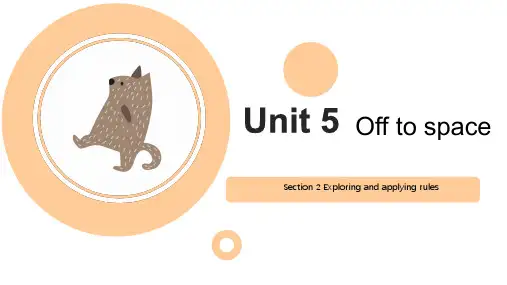
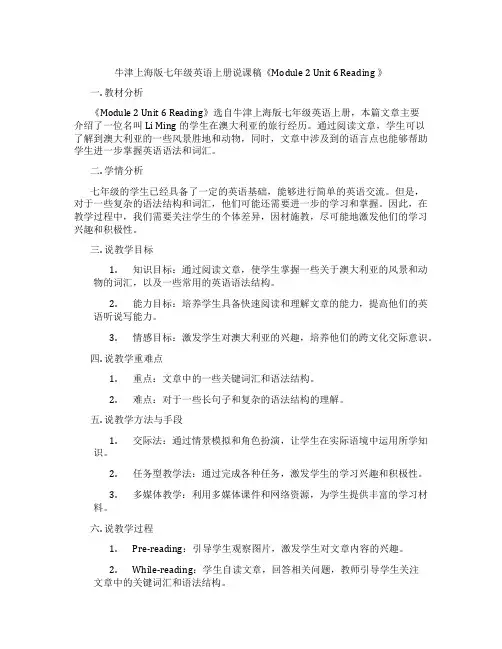
牛津上海版七年级英语上册说课稿《Module 2 Unit 6 Reading 》一. 教材分析《Module 2 Unit 6 Reading》选自牛津上海版七年级英语上册,本篇文章主要介绍了一位名叫Li Ming的学生在澳大利亚的旅行经历。
通过阅读文章,学生可以了解到澳大利亚的一些风景胜地和动物,同时,文章中涉及到的语言点也能够帮助学生进一步掌握英语语法和词汇。
二. 学情分析七年级的学生已经具备了一定的英语基础,能够进行简单的英语交流。
但是,对于一些复杂的语法结构和词汇,他们可能还需要进一步的学习和掌握。
因此,在教学过程中,我们需要关注学生的个体差异,因材施教,尽可能地激发他们的学习兴趣和积极性。
三. 说教学目标1.知识目标:通过阅读文章,使学生掌握一些关于澳大利亚的风景和动物的词汇,以及一些常用的英语语法结构。
2.能力目标:培养学生具备快速阅读和理解文章的能力,提高他们的英语听说写能力。
3.情感目标:激发学生对澳大利亚的兴趣,培养他们的跨文化交际意识。
四. 说教学重难点1.重点:文章中的一些关键词汇和语法结构。
2.难点:对于一些长句子和复杂的语法结构的理解。
五. 说教学方法与手段1.交际法:通过情景模拟和角色扮演,让学生在实际语境中运用所学知识。
2.任务型教学法:通过完成各种任务,激发学生的学习兴趣和积极性。
3.多媒体教学:利用多媒体课件和网络资源,为学生提供丰富的学习材料。
六. 说教学过程1.Pre-reading:引导学生观察图片,激发学生对文章内容的兴趣。
2.While-reading:学生自读文章,回答相关问题,教师引导学生关注文章中的关键词汇和语法结构。
3.Post-reading:学生进行小组讨论,分享自己的阅读心得,教师进行点评和指导。
七. 说板书设计板书设计要简洁明了,能够突出文章的主题和关键词汇。
可以设计如下板书:Title: My Trip to AustraliaKeywords:1.Sydney Opera House2.Kangaroo3.Beautiful scenery4.Fun activitiesGrammar points:1.现在进行时2.一般现在时八. 说教学评价教学评价可以从以下几个方面进行:1.学生的课堂参与度:观察学生在课堂上的积极性和平时的作业完成情况。
牛津上海版七年级英语上册Unit1-10全册听力练习题汇总本文档汇总了牛津上海版七年级英语上册Unit1-10全册的听力练题。
这些练题旨在帮助学生提高他们的听力技能,并加深对课本内容的理解。
Unit 11. Listen to the conversation and answer the questions.Unit 21. Listen to the dialogue and choose the correct answers.2. Listen to the passage and answer the questions.Unit 31. Listen to the conversation and fill in the blanks.2. Listen to the passage and match the sentences with the pictures.Unit 41. Listen to the dialogue and decide whether the statements are true or false.Unit 51. Listen to the conversation and choose the correct answers.2. Listen to the passage and answer the questions.Unit 61. Listen to the dialogue and fill in the blanks.Unit 71. Listen to the conversation and decide whether the statements are true or false.2. Listen to the passage and answer the questions.Unit 81. Listen to the dialogue and choose the correct answers.Unit 91. Listen to the conversation and fill in the blanks.2. Listen to the passage and match the sentences with the pictures.Unit 101. Listen to the dialogue and decide whether the statements are true or false.2. Listen to the passage and answer the questions.以上是牛津上海版七年级英语上册Unit1-10全册的听力练习题汇总。
二、单选题2. Which of the following words matches the sound/`flaʊə/?A .flightB .floorC .flourD .fork3. I've made a cake for Ben. It tastes____________.A .wonderfullyB .lovelyC .deliciousD .well4. We_____________ "Happy Birthday" to Ben at his birthday party.A .toldB .spokeC .talkedD .said【小题5】M. White plans to___________/`dekəreɪt/the kitchen again this summer.【小题4】We have prepared a lot of___________/dɪ`lɪʃəs/ food and drinks for the party.【小题3】You should brush your teeth twice a day at___________/li: st/.【小题2】___________ /`fɜːstlɪ/,let's deal with the most important part of this task.【小题1】Kitty gave us some___________/`ju: sfl/information on international foods. Complete the sentences according to the given phonetic transcriptions (根据所给音标完成句子)1.一、根据首字母填空上海初一课时练习54次牛津上海版英语七年级第一学期Unit Ten Test12-075. I always do my homework ________ Sunday morning.A.in B.on C./D.at6. Wow! This park is so beautiful. Let's ____________some photographs in it.A.make B.have C.take D.get7. I'd rather ____________at home and watch DVDs.A.stay B.staying C.to stay D.stays8. I am looking forward to ____________my own bedroom.A.have B.has C.having D.had9. I am going to eat ____________vegetables every day. They are good for me.A.much B.more C.few D.less10. ____________, mix 100 grams of sugar and 100 grams of butter together.A.One B.Firstly C.Once D.After11. Mary would like ____________some reading before she goes to bed.A.doing B.do C.did D.to do12. It's raining hard outside, ____________ let's stay at home.A.but B.so C.because D.if13. —Shall we buy some orange juice for our picnic?—____________A.That's a good idea.B.That's right.C.I'd like to.D.What a pity!14. —I'm afraid I can't come to your party.—____________A.Excuse me.B.No problem.C.That's right.D.What a pity!三、用单词的正确形式完成短文15. Complete the following passage with the words or phrases in the box: Each can only be used once(将下列单词或词组填入空格。
7A UNIT 1 Making friendsⅠ重点单词:World n. 世界country n.国家Japan n.日本Germany n.德国German adj.德国的n.德国人grammar n.语法blog n.博客sound n. 声音Everyone n.人人(谓语动词要用单数)Hobby n.爱好(复数hobbies)age n. 年龄elder adj. 年长的dream n.梦想complete v.完成Us pron.我们yourself pron.你自己friendly adj. 友爱的engineer n.工程师flat n.公寓mountain n. 山Ⅰ重点短语:1.colse to 接近= near 反义词:far (away)from 远离2.Go to school 去上学3.Be good at 擅长=do well in 反义词:be bad /poor at=do badly in不擅长4.Make friends with 与……交朋友make friends 交朋友5.All over遍及6.I’d like to=would like to 愿意Ⅰ 重点句型:1.what does···mean?2.welcome to3.I like···because···4.My dream is to be··?5.How old is/are ····?6.What does ····do?详细讲解:1.Read a German girl’s blog。
(Page1)(1)German :① adj.德国的(德国人的,德语的)This is a German car。
Unit 1&2一、重点、难点归纳1.冠词a, an, the(1) a 用于辅音音素开头的单数可数名词前,如:a pen, a book, a universityan用于元音音素开头的单数可数名词前,如:an egg, an hour, an honest boy, an unclethe用于再次提到的人或事物前,如:I have a new schoolbag. The schoolbag is black.(2)哪些情况必需利用the:A.____________________________________如:Please open the door.B.____________________________________如:The sun goes up in the east.C.____________________________________如:Who is the tallest girl in our class?D.____________________________________如:the oldE.____________________________________如:the Smiths(3)不加the的情况:A.____________________________________如:have breakfast, play basketball, speak English.B.____________________________________如:in 2021, in winterC.____________________________________如:my pen, this book2.一般此刻时一般此刻时表示常常发生的动作或存在的状态、日常行为、习惯或客观事实等。
常常利历时间状语有:______________________________________________.当主语是第三人称单数时,谓语动词要用第三人称单数形式,其转变规则是:A.____________________________________B.____________________________________C.____________________________________D.特殊:have----has二、重点句式1. be friendly to = be kind to = be nice to 对……友好的2. why not do sth. = why don’t you do sth. 为何不……E.g. Why not stay at home instead of going outside on such a rainy day?3. sb spend money/time on sth.sb. spend money/time (in) doing sth.sb. pay money for sth.sth. cost sb. time/money.It. takes sb. time to do sth.三、话题学习如何交朋友和计划咱们的每日生活。
过关检测一、辞汇1. We can get a lot of i__________ from the Internet.2. My friend invited me to dinner at a French r__________ yesterday.3. The two pairs of shoes are both beautiful, it’s difficult for me to c__________.4. We can’t go out until we c__________ our homework.5. She looks so young, I can’t guess her real a__________.6. Tom always w__________ his face and brushes his teeth before he goes to bed.7. Sandy goes to have the swimming lesson t__________ a week.8. Snake is a kind of very d__________ animal.9. Everyone is here e__________ Tony. I don’t know where he is.10. Why didn’t you come to school yesterday? Please tell me the r__________.二、短语翻译at school one of the bestnext to in glassesmake phone calls to on weekdaysbe late for ahead of sb.on the rails take up在左侧对某人友好去游泳吃早饭在去…….的路上照顾半小时在途中在闲暇时洗碗三、重点句式及语法A 按要求作相应的句型转换1. Miss Liu usually spends an hour in correcting papers.(改成同义句)It usually ___________ Miss Liu an hour ___________ ___________ papers.2. The volunteers were friendly to visitors during 2021 Shanghai Expo.(划线提问)___________ were the volunteers ___________ ___________during the 2021 Shanghai Expo?3. Why don’t you visit a student’s family in the evening?(改成同义句)___________ ___________ ___________a student’s family in the evening?4. My parents own a big restaurant. (划线提问)___________ ___________your parents own?5. It’s about two kilometers from the school to my home. (划线提问)___________ ___________ ___________ it from the school to my home?B 按照中文完成句子1 Phelps 是世界上最好的游泳者之一。
Phelps is one of _________ _________ _________ in the world.2 四年前他担任教师的工作。
He _________ _________ a teacher four years ago.3 咱们学校的校运会持续了三天。
Our school sports meeting _________ _________ three days.4 你未来想做什么工作?What do you want to be _________ _________ _________?5 我常常打给我的朋友。
I often _________ _________ _________ _________ my friends.6 因为我没有说实话,所以妈妈生气了。
Because I didn’t _________ _________ _________, my mother _________ _________.C 语法巩固练习1. ---- Do you have the key to _________ blue car?---- I think _________ key is on the desk.A.the;theB.the;\C.\; theD.a;a2. ---- Are you good at playing _________ basketball or playing _________ piano?----- Both.A.a;aB.the; theC.the; \D.\; the3. We can see _________ full moon on the evening of August _________ fifteenth every year.A.the; aB.a; aC.a; theD.the; the4. She never _________ her problems with her parents.A.discussB.discussesC.is discussingD.arediscussing5. _________ Mary _________ her hair every day?A.Do; washB.Do; washesC.Does; washD.Is; washingUnit 3&4一、重点、难点归纳1.一般过去时一般过去时表示过去某一时间所发生的动作或存在的状态,一般与表示过去的时间连用。
一般过去时的句子中谓语动词要用过去式。
动词过去式转变规则:(1)(2)(3)(4)(5)不规则动词的过去式要逐个记忆。
常见的表示一般过去时态的时间状语有:2.When引导的时间状语从句The sky went dark when we arrived.When引导的时间状语从句可放主句前面或后面,放在主句前面时要用逗号与主句隔开。
E.g. He was doing his homework when I came into his room.= When I came into his room, he was doing his homework.3.used to do sth. 过去常常做某事be used to doing sth 习惯于做某事be used to do sth. 被用来做某事二、重点句式1.What about…? = How about …?What about having some bread? = Would you like some bread?2.It is adj. of/for sb. to do sth.(1)若是形容词用来描述不定式行为者的性格、品质的,用_____, 这种形容词有______________________________________________.(2)若是形容词仅仅用来描述事物,用___________。